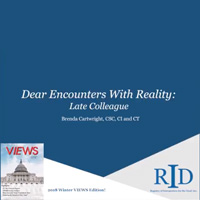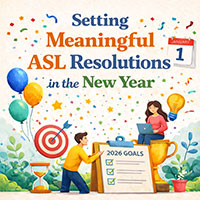Articles tagged as Dear BC
Interpreter Q & A: If the Deaf client isn’t paying attention, should the interpreter keep signing?
This Interpreter Q & A ask: If the Deaf client isn’t paying attention, should the interpreter keep signing as normal? This article is part of our "Dear BC, Interpreter Q & A” series, which answers questions on interpreting and Deaf culture from multiple perspectives.
Interpreter Q & A: Using Your Phone During a Break
This Interpreter Q & A asks: During a lull in a staff meeting where I was interpreting, I used my phone to enter some appointments into my calendar (and check my grocery list). Afterwards, my team interpreter told me that she thought doing that was rude and unprofessional. Do you agree?
This article is part of our "Dear BC, Interpreter Q & A” series, which answers questions on interpreting and Deaf culture from multiple perspectives.
Interpreter Q & A: What are our boundaries as interpreters to say something to a Deaf client about their right to request a qualified interpreter?
This Interpreter Q & A asks: During a doctor’s appointment I interpreted, the doctor referred the Deaf patient to physical therapy. When we were leaving the office, the Deaf client asked me about my availability to interpret her upcoming physical therapy appointments. I told the Deaf woman my schedule and she said, “Oh well, that’s fine, if you can’t come, my daughter will come and interpret.” Her daughter is a young girl who can sign, but she is not an interpreter. The daughter has no training or certification.
What are our boundaries as interpreters to say something to a Deaf client about their right to request a qualified interpreter? I don’t want to look like I’m just trying to make money. My concern is also that her doctors will begin to think that they don’t need to hire interpreters for her because she can just bring her daughter for free.
This article is part of our "Dear BC, Interpreter Q & A” series, which answers questions on interpreting and Deaf culture from multiple perspectives. This article was also published in the Fall 2018 (Issue 35 Volume 4) Edition of VIEWS Magazine from RID.
Interpreter Q & A: Will Technology and Cochlear Implants Make Interpreters Become Obsolete
This Interpreter Q & A asks: I am currently in an interpreter training program, but I’m starting to have doubts about the viability of my choice of careers. My concern is twofold. I’ve heard several experts say that interpreters will one day be replaced by technology! I also am aware that cochlear implants are a big deal for parents with young deaf children, so I’m wondering if maybe interpreters will become obsolete. What do you think?
This article is part of our "Dear BC, Interpreter Q & A” series, which answers questions on interpreting and Deaf culture from multiple perspectives.
Interpreter Q & A: Is it ok to eat at a work event once my assignment ends?
This Interpreter Q & A asks: I was asked to interpret for an art department showcase. Food was served during the presentations. After it was over there was an announcement that there was tons of food left and for everyone to "eat up!" My client encouraged me to get some food. My interpreting duties were finished, but I still felt strange about it. I wasn’t sure if it was appropriate?
This article is part of our "Dear BC, Interpreter Q & A” series, which answers questions on interpreting and Deaf culture from multiple perspectives. This article was also published in the Summer 2018 (Issue 35 Volume 3) Edition of VIEWS Magazine from RID.
Interpreter Q & A: Should interpreters share stories about their day (and their clients)?
This Interpreter Q & A asks: My neighbor is an interpreter and she was telling me about all the gory things she has to face on a daily basis as an interpreter: feces, fungus, blood, naked bodies, nasty smells, foul language etc... No names of clients were disclosed but I couldn’t help but wonder how Deaf people would feel if they knew that she was talking and laughing about them. I remember when I was in the hospital, I was so sick I puked. I’m sure my poop stunk. I’m sure I looked like crap. I hope my nurses didn’t talk about me. I think the same should apply to interpreters. What is your opinion about this?
This article is part of our "Dear BC, Interpreter Q & A” series, which answers questions on interpreting and Deaf culture from multiple perspectives. This article was also published in the Spring 2018 (Issue 35 Volume 2) Edition of VIEWS Magazine from RID.
Interpreter Q & A: What to do when your team interpreter has an unexcused (and provocative) absence?
This article is part of our "Dear BC, Interpreter Q & A” series, which answers questions on interpreting and Deaf culture from multiple perspectives. This article was also published in the Winter 2018 Edition of VIEWS Magazine (page 28-29) from RID. VIEWS is a digital publication distributed quarterly by the Registry of Interpreters for the Deaf (RID) and dedicated to the interpreting profession. The magazine includes RID member spotlights, announcements from the RID board, and engaging stories about issues impacting the ...
Interpreter Q & A: Why do ITP students date Deaf people while they are in the program?
This Interpreter Q & A asks: A recent phenomenon I have noticed is a growing tendency for ITP students to date Deaf people while they are in the program. What is behind this?
This article is part of our "Dear BC, Interpreter Q & A” series, which answers questions on interpreting and Deaf culture from multiple perspectives. This article was also published in the Fall 2017 Edition of VIEWS Magazine from RID.
Interpreter Q & A: Wearing a Brace While Interpreting
This Interpreter Q & A asks: I am currently wearing a brace on my wrist for Carpal Tunnel Syndrome. Today during a break the Deaf client came up to me and asked me to remove my brace because she found it distracting and it affected my clarity. She also said it made her feel guilty for having to make me work. What do you think I should have done?
This article is part of our "Dear BC, Interpreter Q & A” series, which answers questions on interpreting and Deaf culture from multiple perspectives.
Interpreter Q & A: Asking Questions vs. Being Nosey
This Interpreter Q & A asks: In an educational setting, a student asked me to accompany her to interpret a conversation with one of her teachers. On the way to the teacher’s classroom, I asked “What did you need to see the teacher for?” The deaf student responded, “It’s none of your business, you are the interpreter and you will do what I tell you to do!” Needless to say, I was shocked at this answer.
I always try to prepare myself and avoid misunderstandings. For example, before going into a doctor’s office, I ask the client why they’re there, to prepare myself as well as to get a feel for the client’s signing style, etc. I’m not being nosey and I feel this response was very curt and rude. Is this how we are viewed?
This article is part of our "Dear BC, Interpreter Q & A” series, which answers questions on interpreting and Deaf culture from multiple perspectives.
ADVERTISEMENTS

















